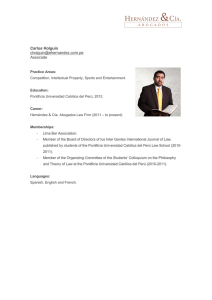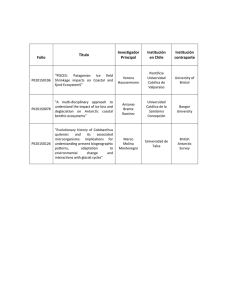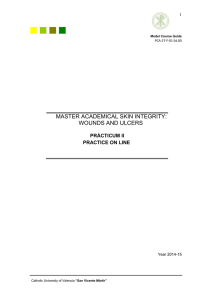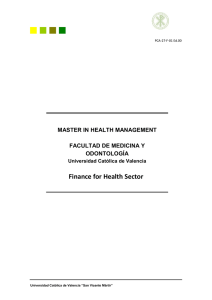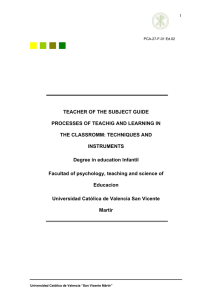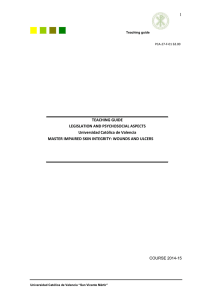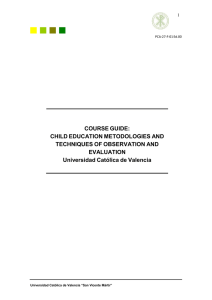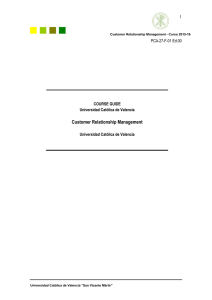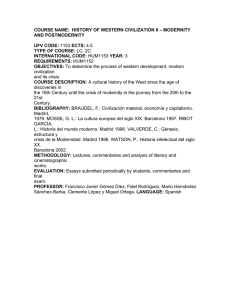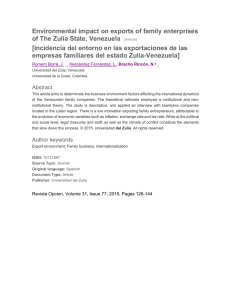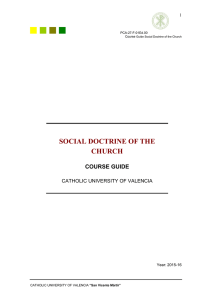1 - Universidad Católica de Valencia
Anuncio
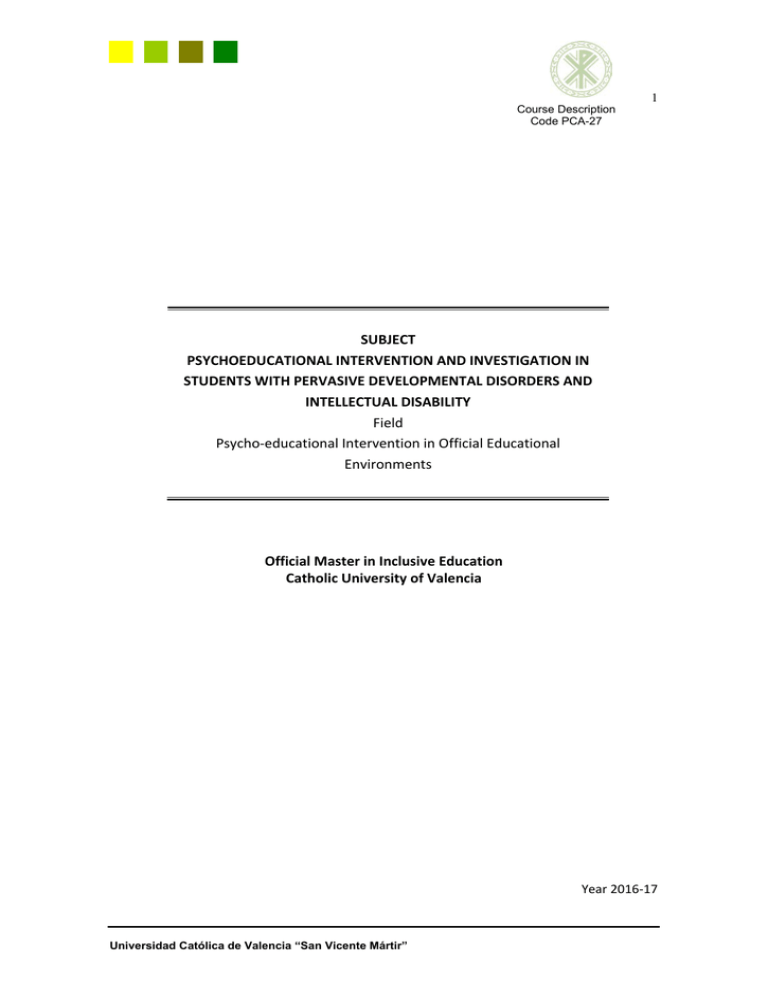
1 Course Description Code PCA-27 SUBJECT PSYCHOEDUCATIONAL INTERVENTION AND INVESTIGATION IN STUDENTS WITH PERVASIVE DEVELOPMENTAL DISORDERS AND INTELLECTUAL DISABILITY Field Psycho-educational Intervention in Official Educational Environments Official Master in Inclusive Education Catholic University of Valencia Year 2016-17 Universidad Católica de Valencia “San Vicente Mártir” 2 Course Description Code PCA-27 COURSE GUIDE OF THE SUBJECT ECTS Subject: Psychoeducational intervention and investigation in students with pervasive developmental disorders and intellectual disability 3 YEAR: 1 Semester: 2nd Type of Learning 1: Obligatory Department: Inclusive Education, Social-Community Development and Occupational Sciences. Teacher: Dra. Raquel Sánchez Padilla E-mail: [email protected] SUBJECT ORGANIZATION ____________________________________________________________________________ Fields and Subjects Field Psycho-educational intervention in official educational environments SUBJECT Psychoeducational intervention and investigation in students with pervasive developmental disorders and intellectual disability. ECTS Year/ Semester 3 1/2 COURSE GUIDE FOR SUBJECT Prerequisites: None GENERAL GOALS 1 Basic learning (common subject), Compulsory subjects, Optional subjects, External practices, Grade final project. Universidad Católica de Valencia “San Vicente Mártir” 3 Course Description Code PCA-27 To acquire strategies, resources and knowledge that favour the detection of intellectual disability and pervasive developmental disorders, as well as the selection of communication systems and suitable technical tools which allow students to plan intervention and an educational follow-up of student with support needs due to those deficiencies. Competence measuring scales BASIC COMPETENCES 1 2 3 B7. Students should know how to apply acquired knowledge and their ability to solve problems in new or not well-known environments in broader contexts (multidisciplinary) related with their area of study. B10. Students should have learning abilities that allow them to carry on studying in a self-sufficient and self-directed way. 4 X X GENERAL COMPETENCES Competence measuring scales 1 2 3 G4. To develop new knowledge and specialized techniques which are suitable for investigation and progress. 4 X SPECIFIC COMPETENCES 1 E1 To be able to design and carry out programs that optimize the academic performance of children with specific needs, as well as their personal and social development, in the framework of an inclusive education. E6 Select and apply the scientific method to the election, Development and Implementation of Instruments and Methods of exploration, evaluation and diagnosis to determine S. Specific Needs Educational Support of different students . E7 To design programs and treatments that attend to the individual needs detected, based on scientific evidence, which promote inclusion. E11 To know how to detect and analyze possible barriers to the full participation of students in the educational environments where they are, as well as how to contribute to their elimination. LEARNING OUTCOMES Universidad Católica de Valencia “San Vicente Mártir” 2 3 4 X X X X COMPETENCES 4 Course Description Code PCA-27 E6, E7,E12, B7, B10, G4 R3 The student develops inclusive educational activities. R2. The student identifies the different measures of attention to diversity , one of each of the cases in question E7, B7, E12, B10, G4 R7 The student develops a plan of action tutorial that addresses the global needs of every need. B7,E1, E6 R9 The student understands the specific needs of support that students could have and how they affect their development. E6, E7,E12,B7, B10, G4 ON-CAMPUS EDUCATIONAL ACTIVITIES Relationship between Course and Learning Outcomes ECTS Teacher presentation of contents, analysis of competences, explanation and in-class display of skills, abilities and knowledge, which require the feed-back and involvement of the student. R3, R2, R9, 0.4 PRACTICAL CLASSES Group work sessions supervised by the professor. Case studies. Meaningful construction of knowledge through interaction and activity of the student. R3, R9, R7 0.1 FACE-TO-FACE TUTORIALS Personalized attention for the student, individual or in a small group. Period of instruction and/or orientation carried out by a tutor for the purpose of reviewing and discussing the materials and topics presented in class. R3, R2, R9 0.1 ACTIVITY PARTICIPATIVE MASTER CLASS Teaching-Learning Methodology Total Universidad Católica de Valencia “San Vicente Mártir” (0,6) 5 Course Description Code PCA-27 NON ON-CAMPUS EDUCATIONAL ACTIVITIES ACTIVITY Teaching-Learning Methodology Relationship between Course and Learning Outcomes ECTS R3, R4, R9, 0.1 R3, R9, 0.2 R3, R2, R9 0.3 Personalized attention to the student in a virtual and individual way through the university elearning platform: https://campusvirtual.uc v.es/. ONLINE TUTORING It’s a period of instruction and orientation carried out by a teacher which has as purpose to review and discuss the materials and issues covered in class, to help with the activities of the ongoing assessment, etc. ASYNCHRONOUS ONLINE SESSION Exposition of the contents by the teacher, analysis of competences, explication and demonstration of abilities, skills and knowledge in the Virtual classroom, which requires feed-back and involvement of the students at different moments. ONGOING ASSESSMENT ACTIVITIES Commentaries, summaries, book reviews, critical analysis and development of texts, glossaries, web quests, tests, etc., which are designed in order to assess, individually or in groups, the level of acquisition of the learning outcomes of different subjects through the university e-learning platform: https://campusvirtual.ucv.es/. Total Universidad Católica de Valencia “San Vicente Mártir” (0,6) 6 Course Description Code PCA-27 INDEPENDENT WORK ACTIVITIES OF THE STUDENT ACTIVITY INDEPENDENT WORK Teaching-Learning Methodology Student study: Group or Individual preparation of readings, essays, concept maps, problem solving, seminars, papers, reports, etc. to be presented or submitted in theoretical lectures, practical and/or Small-group tutoring sessions. Relationship between Course and Learning Outcomes ECTS R3, R2, R9 1.8 It can also be submitted to the university e-learning platform. https://campusvirtual. ucv.es/. Total Universidad Católica de Valencia “San Vicente Mártir” (1,8) 7 Course Description Code PCA-27 SYSTEM FOR ASSESSING THE ACQUISITION OF THE COMPETENCES AND ASSESSMENT SYSTEM Assessment Tool LEARNING OUTCOMES ASSESSED Allocated Percentage Individual work: Case studies R3, R2, R9 30% Individual work: Design of a classroom 40% R3, R9, R2, R7 activity that favours inclusion Attendance to on-campus session and participation R3, R9, R2 30% in activities Criterion of concession of the Mention of Distinction: From the obtaining of 9 on and providing that the obtained result is a consequence of an excellent academic progress together with an effort and interest for the subject. Comments: Note 1 In the description of the content and assessment criteria of the subject the procedure, reference materials and deadline dates will be explained, and they will also be described by the coordinator of the subject in the first class session. Note 2 Failure to follow the rules and deadlines for the completion of academic activities invalidates the note. Universidad Católica de Valencia “San Vicente Mártir” 8 Course Description Code PCA-27 DESCRIPTION OF CONTENTS Organization in contents blocks or thematic groups. Development of contents in didactic guides. 1. 2. Indicators of cognitive disability and ASD. Detection in schools. Learning difficulties in children with autism and intellectual disability Early intervention. Educational intervention strategies and intervention models in children with autism and intellectual disability 3. Associative Movement as a supporter of inclusion and school integration. 4. Educational inclusion. Solutions for specific educational needs based on educational experiences with students and intellectual disability and ASD. 5. Scientific advances, lines of action present in the group of people with cognitive disability and ASD COMPETENCES (Indicate, numerically, the related competences) E6, E7,B7, B10, G4 E6, E7, E11,B7, B10 E6, E7,B7, B10, G4 E6, E7,E11, B7, B10 E6, E11, B7, B10, G4 BIBLIOGRAFÍA Atención temprana y educación infantil: un marco para el desarrollo (2001). Asociación de Padres de niños Autistas de Baleare. Palma de Mallorca Ainscow, M. (2004). Desarrollo de escuelas inclusivas. Ideas, propuestas y experiencias para mejorar las instituciones escolares. Madrid: Narcea. Alcantud, F. (coord.) (2003). Intervención psicoeducativa en niños con trastornos generalizados del desarrollo. Madrid, Pirámide. Alcantud, f. (coord.) (2013). Trastornos del espectro autista. Detección, diagnóstico e intervención temprana. Madrid, Pirámide. Artigas-Pallarés, J., Narbona,J (.2011). Trastornos del neurodesarrollo. Barcelona: Ed: Viguera. Belinchón Carmona, Mercedes. (2010). Investigaciones sobre Autismo en Español. Problemas y Perspectivas. Madrid: Autor –Editor. Belinchón Carmona, Mercedes., Oliver Parra, J. (2000). Comunicacion y trastornos del desarrollo: evaluacion de la competencia (comunicativo-referencial) de personas con autismo. Universidad Universidad Católica de Valencia “San Vicente Mártir” 9 de Valladolid: Secretariado de publicaciones EI Course Description Code PCA-27 Belinchón; Tamarit; Casas; Díez. (2014). Accesibilidad cognitiva en los centros educativos. MEC Bekley, S. y Bird, G. (2005). Habla, lenguaje y comunicación en alumnos con Síndrome de Down. Recursos para padres y profesores. Madrid, CEPE. BRODERICK, A. (2010). Autismo «Recuperación (a la normalidad)» y las Políticas de la Esperanza. Siglo Cero, 236, 33-64. Canal-Bedia, R., García-Primo, P., Hernández-Fabián, A., Magán-Maganto, M., Sánchez, A. B., & PosadaDe la Paz, M. (2015). De la detección precoz a la atención temprana: estrategias de intervención a partir del cribado prospectivo.Revista de Neurología, 60(s01), 25-S29. Carrión, J. J. (2001). Integración escolar: ¿Plataforma para una escuela inclusiva? Archidona: Aljibe. Consejo Pontificio para la Familia (2000). La familia y la integración del minusválido en la infancia y en la adolescencia. Madrid: Palabra. De Pablo-Blanco, C., Rodríguez Román, MªJ. (2010). Manual práctico de discapacidad intelectual. Madrid: Editorial Síntesis. FEVAS .Guía de materiales para la inclusión educativa: Discapacidad intelectual y del desarrollo. Educación infantil/primaria/ secundaria. García, J.M., Pérez J., Berruezo P.P., (2002). Discapacidad intelectual. Desarrollo, comunicación e intervención. Madrid. CEPE. Gervilla, Á. (2008). Familia y educación familiar: conceptos clave, situación actual y valores. Madrid: Narcea. Gil, Francisco. , León, José M.ª.( 2009 Madrid: Editorial Síntesis. ) Habilidades sociales. Teoría, Investigación e Intervención. Gutiérrez, M. J. (2005). La atención a la diversidad y las necesidades educativas especiales. Santander: ANPE. Klin, A., Klaiman, C., & Jones, W. (2015). Rebajar la edad de diagnóstico del autismo: la neurociencia del desarrollo social afronta un importante problema de salud pública. Revista de Neurología, 60(s01), 3-S11. López, M. y Carbonell, R. (2005). La integración educativa y social. Ariel: Barcelona. López, M., López, M. y Llorent, V. J. (coords.) (2009). La discapacidad: aspectos educativos y sociales. Archidona: Aljibe. Martinez Alvernia, C. F. (2015). Equinoterapia en niños con autismo. MacDonald, R. P., Dickson, C. A., Martineau, M., & Ahearn, W. H. (2015). Prerequisite Skills That Support Learning through Video Modeling. Education and Treatment of Children, 38(1), 33-47. Mesibov, Gary., Howley, Marie (2010) El acceso al currículo por alumnos con trastornos del espectro del autismo : utilizando el programa TEACCH para favorecer la inclusión. Editorial: Autismo Ávila. Molina, Á. (2015). Neuropsicología y comunicación familiar en el autismo de asperger. Ajayu Órgano de Universidad Católica de Valencia “San Vicente Mártir” 10 Difusión Científica del Departamento de Psicología UCBSP, 5(2). Course Description Code PCA-27 Sánchez, A. (1997). Estrategias de trabajo intelectual para la atención a la diversidad. Perspectiva didáctica. Málaga: Aljibe. Sánchez, A. y Torres, J. A. (2004). Educación Especial. Centros educativos y profesores ante la diversidad. Madrid: Pirámide. Suárez, L. M., Sánchez, L. E. G., & Rodríguez, M. Á. A. (2015). Relaciones interpersonales en niños y jóvenes con trastornos del espectro del autismo y discapacidad intelectual. REVISTA ESPAÑOLA DE DISCAPACIDAD, 3(1), 77-91. Wing, L., Paterna Molina, P (2011). El autismo en niños y adultos. Una guía para la familia. Barcelona: Paidos Universidad Católica de Valencia “San Vicente Mártir”
